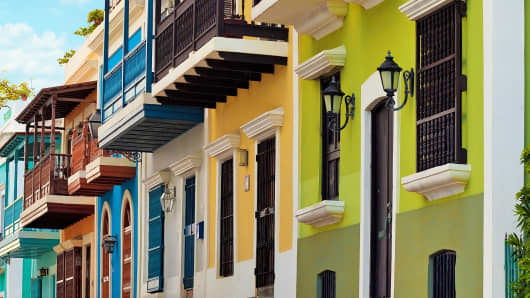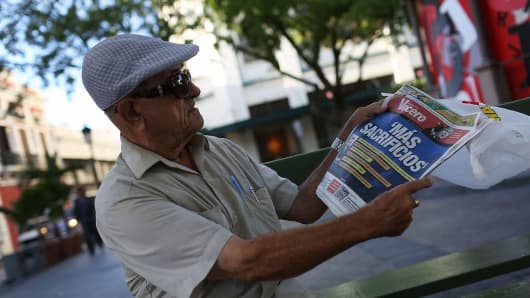
Source: Puerto Rico Tourism Company
Houses in Old San Juan.
The government of Puerto Rico is navigating some tough financial shoals, with some comparing the cash-strapped commonwealth to its European counterpart, Greece.
Yet, like the Hellenic Republic, the island's hospitality and tourism industry is chugging along as briskly as usual, with Puerto Rican officials managing to limit the fallout from the government's inability to make ends meet.
For the island, the stakes are high. Tourism contributes more than $7 billion annually to the economy, according to the World Travel and Tourism Council, with upwards of 3 million international visitors flocking to the island annually, World Bank data shows.
"Despite the economic situation, Puerto Rico is very definitely open for business," said Ingrid Rivera Rocafort, the executive director of thePuerto Rico Tourism Co., the government agency that oversees tourism.
"The electricity is on, banks are open and no attractions: museums, beaches, or anything you'd want to do on vacation, has been affected at all," she added.
As proof that all is well, Rocafort pointed to data showing hotel occupancy rates for April 2015 at 73.3 percent, up 3.2 percent over April 2014. "In informal interviews with hotel owners and developers, they have all stated that June and July occupancy is higher than last year, and that is usually a low season," Rocafort told CNBC.
Separately, travel agents and advisors state demand is holding steady as well.
"Puerto Rico continues to be one of the top five revenue-producing markets for us," says Daniel Marmontello, Caribbean product manager for CheapCaribbean.com. "To date this month, we have had over 1,000 customers book travel to Puerto Rico through our platform," about the same number of bookings as last year at this time, he said.
"I have not run into any objections with clients traveling to Puerto Rico," said Kristy Adler of Cruise and Resort, a member of upscale Virtuoso network. "I also follow several travel agent social media sites, and there's very little talk [of the financial woes] there. Way more discussion about the problems of seaweed in the Cancun area."
The $100 million meetings and conventions market, one of Puerto Rico's strongest industries, seems to be holding its own, as well.
"We have had questions from some of our clients and acknowledge that there are always some concerns," said Milton Segarra, president and CEO of Meet Puerto Rico, the island's convention bureau. "However, through ongoing communication and education to our clients, emphasizing that our sector is strong and not affected by the fiscal situation, we have been able to tone down those worries."
For Puerto Rico tourism, the biggest problem the financial news is causing right now may be one of perception.

Getty Images
Tomas Colon reads a newspaper with a Spanish headline that reads, 'more sacrifices,' a day after the speech Puerto Rican Governor Alejandro Garcia Padilla gave regarding the government's $72 billion debt on June 30, 2015, in San Juan, Puerto Rico.
"You will always have people who say, 'Oh, they are having problems, we better go to the Grand Caymans,' but the reality is there is very little about visiting Puerto Rico that is dependent on the situation with the government," said Ryan Ver Berkmoes, an author of a Lonely Planet guide to the Caribbean Islands.
"The beaches will still be the beaches, Old San Juan will still be Old San Juan and some of the best things to see are the national parks, which are funded by federal, not the local, government," he said.
If Puerto Rico and Greece are any indication, tourists appear to be undaunted from vacationing in economically troubled countries. The Dominican Republic, which has its own tourism challenges, had close to 5 million visitors in 2013 (up from 4.5 million in 2012).
Experts believe a growth in tourism—and continued improvements in the tourism infrastructure—could help boost the island's recovery.
According to Meet Puerto Rico, in the past few years there have been major hotel renovations and openings on the island representing a $100 million investment, as well as improvements of $750 million at the Luis Muñoz Marin International Airport.
Air service to the island has increased, as well, and Puerto Rico's cruise market is growing significantly, with cruise ships bringing 1.2 million passengers on 16 cruise lines.
"Tourism is low hanging fruit," said Robertico Croes, an expert on small island economies and interim chair of the Department of Tourism at the University of Central Florida's college of hospitality management in Orlando.
"Despite desirability, Puerto Rico has lost its competitive edge to other regional destinations and, as a result, has ceded market share," said Croes, "But the bottom line is Puerto Rico has a great product; they just have to sell it better than ever before."
The future of the island, said Croes, may depend on it.
